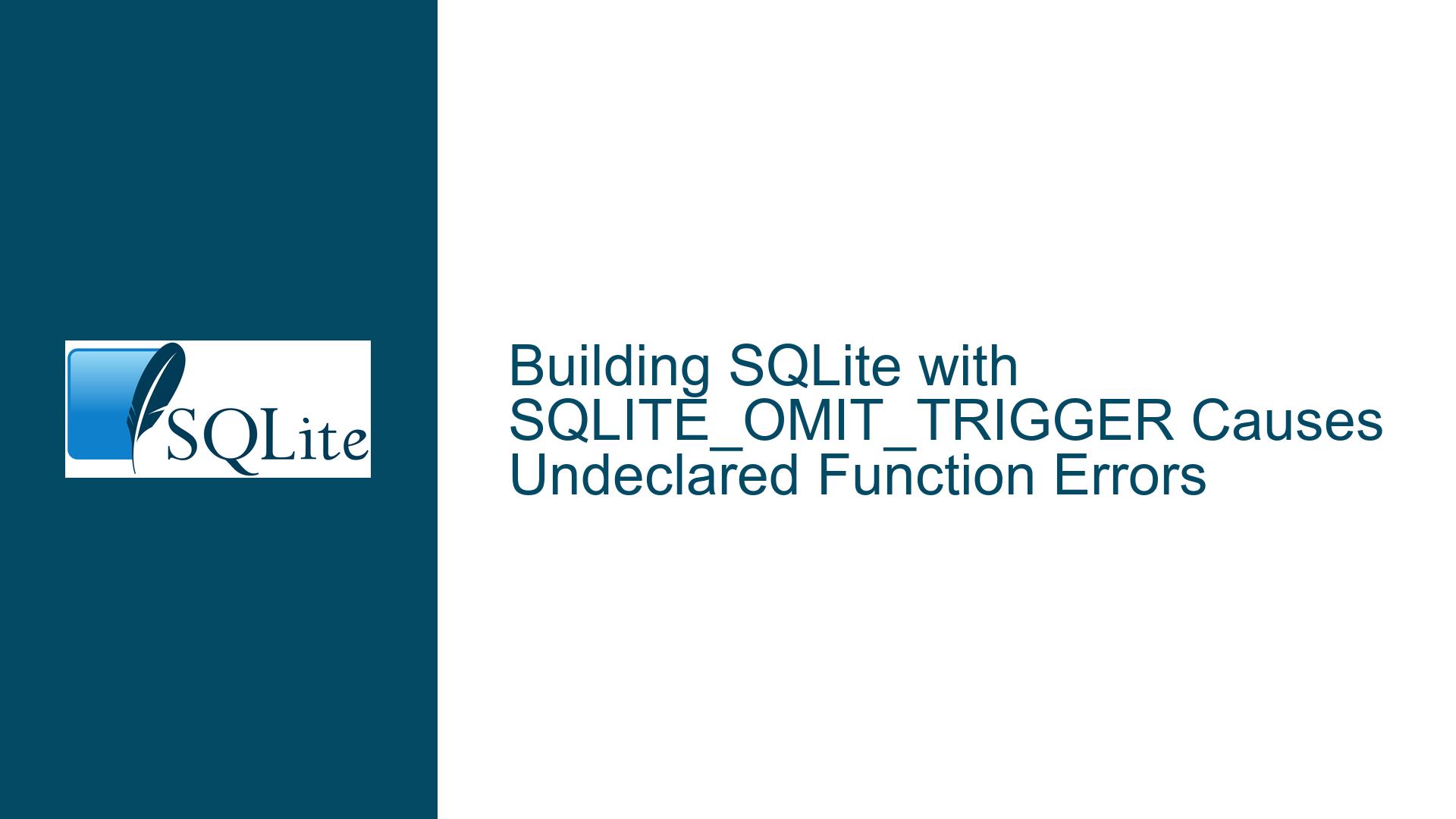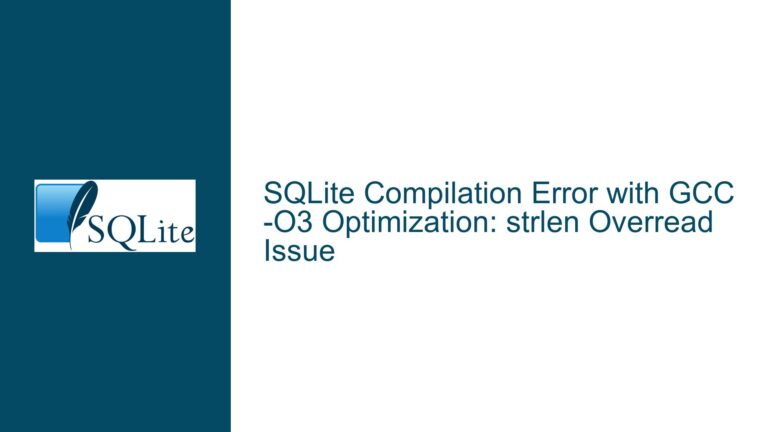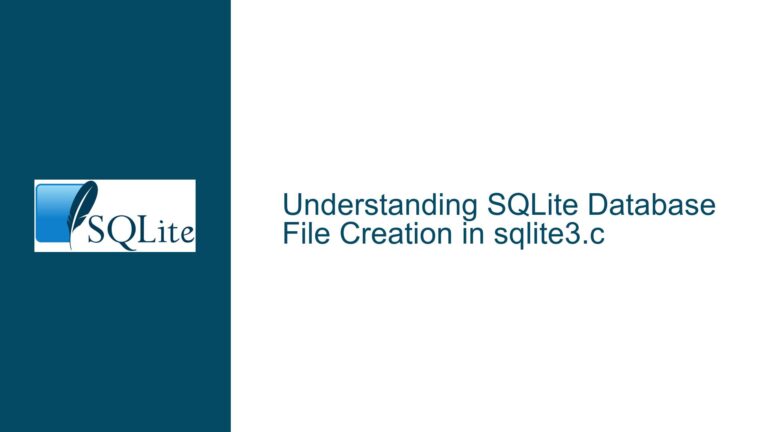Building SQLite with SQLITE_OMIT_TRIGGER Causes Undeclared Function Errors
Issue Overview: Undeclared Function Errors When Compiling SQLite with SQLITE_OMIT_TRIGGER
When attempting to build SQLite with the SQLITE_OMIT_TRIGGER compile-time option enabled, developers encounter a series of compilation errors related to undeclared functions. The most prominent error is the failure to recognize the function sqlite3DeleteTriggerStep, which results in the following error message:
include/sqlite3.c:174980:1: error: call to undeclared function 'sqlite3DeleteTriggerStep'; ISO C99 and later do not support implicit function declarations [-Wimplicit-function-declaration]
174980 | sqlite3DeleteTriggerStep(pParse->db, (yypminor->yy427));
| ^
This error indicates that the compiler cannot find a declaration for the function sqlite3DeleteTriggerStep, which is being called within the SQLite source code. The issue arises because the SQLITE_OMIT_TRIGGER option is designed to exclude trigger-related functionality from the SQLite build. However, the source code still contains references to trigger-related functions, even when this option is enabled. This inconsistency leads to compilation failures.
The problem is not limited to sqlite3DeleteTriggerStep. Other trigger-related functions, such as sqlite3BeginTrigger, sqlite3FinishTrigger, sqlite3DropTrigger, and sqlite3TriggerSelectStep, are also affected. These functions are either undefined or improperly excluded when SQLITE_OMIT_TRIGGER is enabled, causing the build process to fail.
The root cause of this issue lies in the conditional compilation directives within the SQLite source code. When SQLITE_OMIT_TRIGGER is defined, certain functions and macros related to triggers are supposed to be excluded or replaced with no-op implementations. However, the current implementation does not consistently handle all trigger-related functions, leading to the observed errors.
Possible Causes: Incomplete or Incorrect Conditional Compilation Directives
The compilation errors stem from incomplete or incorrect conditional compilation directives in the SQLite source code. Specifically, the SQLITE_OMIT_TRIGGER option is intended to exclude all trigger-related functionality from the build. However, the implementation of this exclusion is inconsistent, resulting in references to undefined functions.
The primary cause is the absence of proper macro definitions for trigger-related functions when SQLITE_OMIT_TRIGGER is enabled. In the SQLite source code, certain functions are conditionally excluded using preprocessor directives. For example, the function sqlite3DeleteTriggerStep is not defined when SQLITE_OMIT_TRIGGER is enabled, but the code still attempts to call it. This discrepancy occurs because the corresponding macro definition for sqlite3DeleteTriggerStep is missing or incorrectly implemented.
Another contributing factor is the reliance on implicit function declarations. In C99 and later standards, implicit function declarations are not supported. When a function is called without a prior declaration, the compiler generates an error. In this case, the SQLite source code calls sqlite3DeleteTriggerStep without providing a declaration, leading to the compilation error.
The patch provided in the discussion addresses this issue by adding macro definitions for all trigger-related functions when SQLITE_OMIT_TRIGGER is enabled. These macros effectively replace the functions with no-op implementations, ensuring that the code compiles without errors. However, the patch highlights the need for a more comprehensive review of the conditional compilation directives in the SQLite source code to ensure consistency and correctness.
Troubleshooting Steps, Solutions & Fixes: Implementing Comprehensive Macro Definitions for SQLITE_OMIT_TRIGGER
To resolve the compilation errors caused by the SQLITE_OMIT_TRIGGER option, developers must ensure that all trigger-related functions are properly excluded or replaced with no-op implementations. This can be achieved by implementing comprehensive macro definitions in the SQLite source code.
The first step is to identify all trigger-related functions that are referenced in the source code. These functions include sqlite3DeleteTriggerStep, sqlite3BeginTrigger, sqlite3FinishTrigger, sqlite3DropTrigger, sqlite3TriggerSelectStep, sqlite3TriggerInsertStep, sqlite3TriggerUpdateStep, and sqlite3TriggerDeleteStep. For each of these functions, a corresponding macro definition must be added to the sqliteInt.h header file.
The macro definitions should replace the functions with no-op implementations when SQLITE_OMIT_TRIGGER is enabled. For example, the macro for sqlite3DeleteTriggerStep can be defined as follows:
#define sqlite3DeleteTriggerStep(A, B)
This macro effectively replaces any call to sqlite3DeleteTriggerStep with an empty statement, ensuring that the code compiles without errors. Similar macros should be defined for all other trigger-related functions.
The patch provided in the discussion demonstrates this approach. It adds the following macro definitions to the sqliteInt.h header file:
#define sqlite3BeginTrigger(A,B,C,D,E,F,G,H,I,J)
#define sqlite3FinishTrigger(A,B,C)
#define sqlite3DeleteTriggerStep(A, B)
#define sqlite3TriggerSelectStep(A,B,C,D) 0
#define sqlite3TriggerInsertStep(A,B,C,D,E,F,G,H) 0
#define sqlite3TriggerUpdateStep(A,B,C,D,E,F,G,H) 0
#define sqlite3TriggerDeleteStep(A,B,C,D,E) 0
These macros ensure that all trigger-related functions are replaced with no-op implementations when SQLITE_OMIT_TRIGGER is enabled. By applying this patch, developers can successfully build SQLite without encountering the undeclared function errors.
In addition to implementing the macro definitions, developers should also review the conditional compilation directives in the SQLite source code to ensure consistency. This includes verifying that all trigger-related functions are properly excluded or replaced when SQLITE_OMIT_TRIGGER is enabled. Any inconsistencies or omissions should be addressed to prevent future compilation errors.
Finally, developers should test the modified SQLite build to ensure that the SQLITE_OMIT_TRIGGER option functions as intended. This includes verifying that trigger-related functionality is completely excluded from the build and that the resulting SQLite library operates correctly without triggers.
By following these troubleshooting steps and implementing the necessary fixes, developers can resolve the compilation errors caused by the SQLITE_OMIT_TRIGGER option and ensure a successful build of SQLite.






